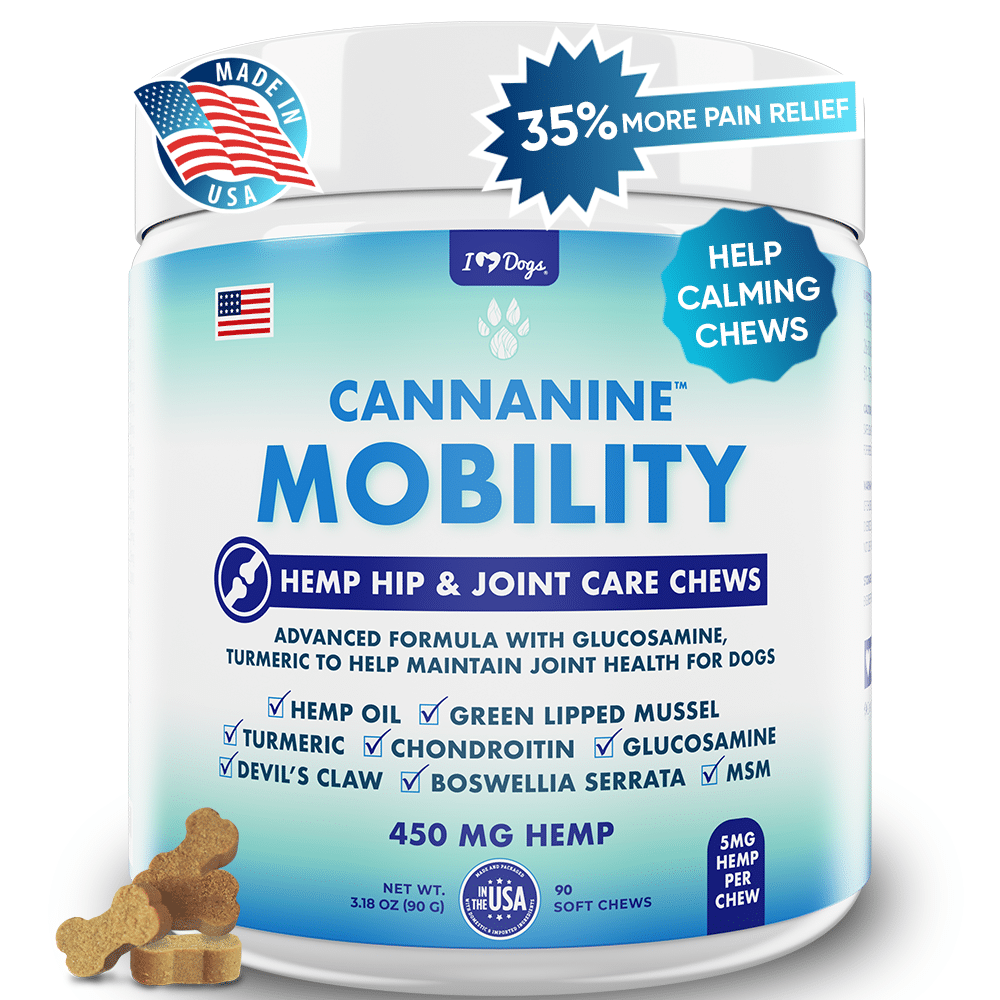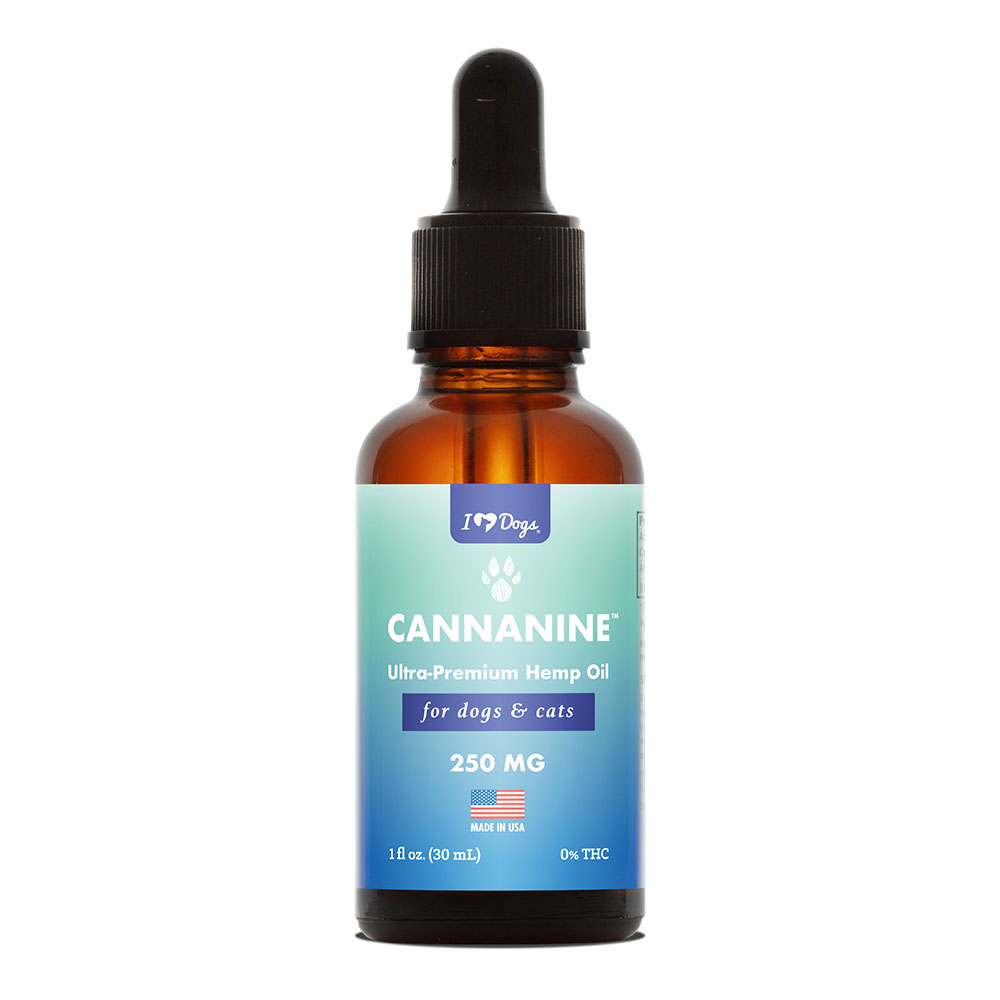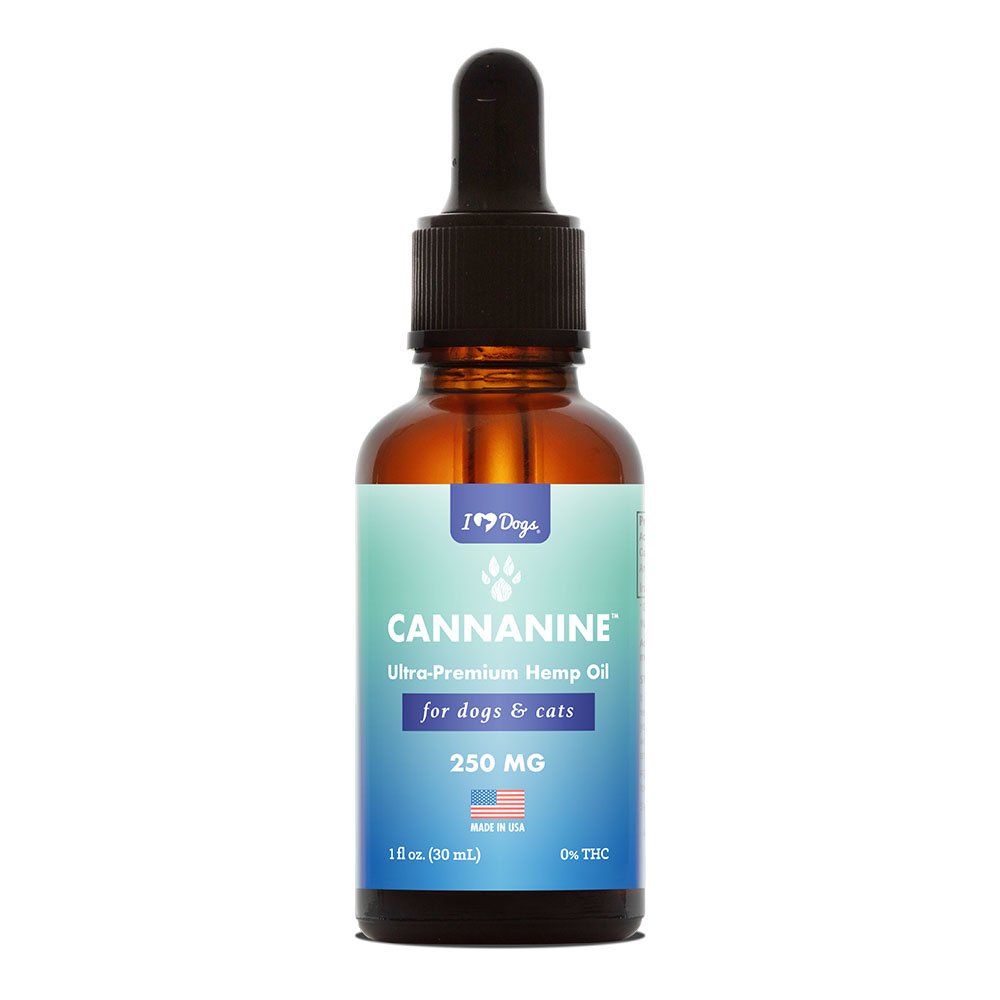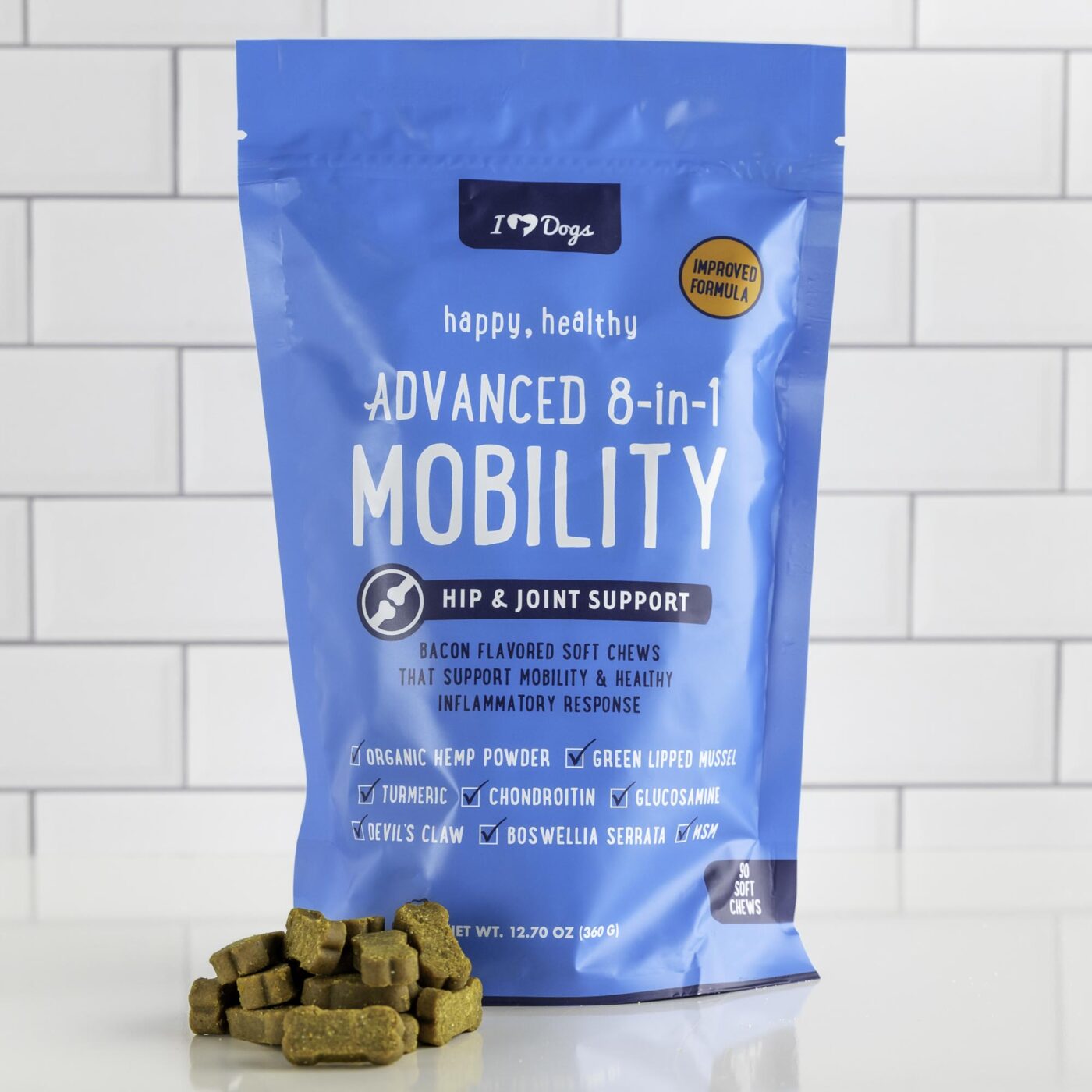French Bulldog Joint Supplements

#1: For Maximum Efficacy, Choose a Supplement for Your French Bulldog with Multiple Active Ingredients
When most people think of a joint supplement for their french bulldog, glucosamine comes to mind. And while glucosamine is the most popular active ingredient, other powerful nutraceuticals include MSM, chondroitin, and turmeric (curcumin). If your supplement contains only one or two of these, you may be missing potential benefits. Different dogs respond to different treatments, so when in doubt, offer a broad spectrum of nutrients.
#2: Always Check The Amount of Active Ingredients
If the quantity of active ingredients (in milligrams) is not made available, the product likely contains low levels that are unlikely to have a therapeutic effect on your french bulldog’s joints. As a rule of thumb, your dog should receive 20 mg of glucosamine daily for each pound they weigh. Budget oriented joint supplements (often in the $15-20 a bottle range) often contain levels too low to make any serious impact on your dog’s joint health. In addition, dry dog food manufacturers have begun including trivial amounts of glucosamine in their products in an attempt to woo consumers. Make sure your dog receives enough to matter!
#3: Always Buy Made In USA
While you’d expect that most pet stores would have transitioned to only carrying consumable products that are made in the USA, this is simply not the case. Many budget oriented pet stores, online retailers, and grocery stores still carry inferior supplements made in factories outside the USA with far lower production standards.
#4: Decide If You Want An Arthritis Supplement with or Without Hemp for Your French Bulldog
The last few years have brought about exciting advancements in the use of Hemp for dogs. Several clinical trials have shown Hemp can improve the mobility of arthritic dogs. Some brands have begun to offer their Hip & Joint supplements with Hemp or without Hemp.
#5: Results Will Vary Based on Your French Bulldog’s Age and Condition
Ideally, a joint supplement regimen should begin before signs of pain are present in your french bulldog. (ideally around 5 years of age, although large breeds may need earlier) In reality, however, we often don’t consider the need until signs of pain are apparent. If your dog is already showing signs of distress, a joint supplement can still offer substantial relief. However, it may take 1-2 months to show signs of improvement.
#6: Taste and Format Matters
The best joint supplement in the world is worthless if your dog refuses to eat it. The most popular formats of delivery for joint supplements are liquid, tablet chews, and soft chews, each with their own benefits and drawbacks. When it comes to palatability, soft chews and liquids tend to please the most canine palates. Because a soft chew can contain a wider variety of nutraceuticals (see item #1) it’s our preferred method.
Where Our Research Led Us (Our Preferred Joint & Joint Supplement for French Bulldogs)
Our research in hip & joint supplements for dogs led us to develop & recommend the Happy, Healthy line of canine joint care supplements. An added bonus of this brand is that each purchase goes towards helping provide food for animal shelters in need.
Do French Bulldogs Need Hip And Joint Supplements?
As French Bulldogs are prone to hip dysplasia, they need joint supplements. Hip dysplasia is another genetic condition that can affect Frenchies. This happens when the ball and socket joint in the hip does not form right. This makes the hip joint wear out faster because it rubs and grinds instead of moving smoothly. Hip dysplasia can get worse because of things like being overweight, growing too fast, and working out too much.
What Supplements Are Good For French Bulldogs Arthritis?
The right supplements can reduce inflammation and speed up the healing process. Supplements containing glucosamine, fish oil, and turmeric are often the three best options for treating hip and joint issues in French Bulldogs. However, several other active ingredients add more benefits, which is why iHeartDogs made the Advanced 8-in-1 Hip and Joint Chews.
Your dog will be back on his feet in no time, thanks to the Advanced 8-in-1 Mobility Chew! It is the optimal blend of eight powerful, natural substances that work together to promote healthier joints, less pain, and improved activity. This combination is what makes it so effective at achieving its goals. Your dog will experience less pain and stiffness due to this all-natural pain reliever’s ability to reduce inflammation, regenerate cartilage, and lubricate joints.
What Can I Give My French Bulldog For Joint Pain & Arthritis?
Some foods, including papaya, alfalfa, celery, or ginger, can naturally fight inflammation in dogs. Additionally, turmeric continues to demonstrate its extremely powerful anti-inflammatory benefits. Beyond supplements, the food you give your pet matters. Avoid foods filled with cheap grains and fillers, opting for protein-dense food instead.
Is Cosequin Or Dasuquin Better For A French Bulldog?
Dasuquin and Cosequin are two options for treating joint discomfort in dogs, and many pet parents have a hard time deciding which one is better. Both of these dietary supplements include glucosamine and sodium chondroitin sulfate, two components that are vital to maintaining healthy joints. Yet, only Cosequin includes the omega-3 fatty acids essential for the body to perform its many activities. Dasuquin, on the other hand, has a component called avocado/soybean unsaponifiables (ASU), which is a molecule that occurs naturally in avocados and soybean oils. The only way to know for sure which one is best for your dog is to put both to the test or to listen to what your veterinarian has to say about it.
Do Small Dog Breeds Need Joint Supplements?
Small dogs are likely to experience joint issues, especially in old age and supplements can prevent unnecessary damage. Additionally, smaller dogs may have more severe problems because they must exert far more effort to get anywhere. Large dogs have the flexibility of size, while smaller dogs are continually making efforts to get places that put added pressure on their joints.
Is There A Natural Remedy For French Bulldogs Arthritis?
Before turning to prescription drugs, dogs can find arthritis relief from several natural remedies like glucosamine, fish oil, and turmeric. Comfrey is another alternative, and it has been shown to be effective in reducing swelling and relieving discomfort. You might also give yucca a try if your bulldog is dealing with inflammation or issues related to your digestive tract. As an extra bonus, it is packed with the nutrients that canines require. Last but not least, omega-3 fatty acids can also play a role in inflammation reduction.
Cannabidiol (CBD), a chemical component present in medical marijuana, also treats the arthritis in your dog. Seizures, anxiety, and cancer are among the ailments that CBD is beneficial in treating, in addition to pain. Moreover, CBD has anti-inflammatory properties that can help with pain relief. According to research, CBD can boost canine comfort and activity when given twice a day at the right dose.
What Are The Signs Of Hip Dysplasia In French Bulldogs?
A few indications will help you know if your bulldog has symptoms of hip dysplasia. Depending on the disease’s severity, the degree of joint inflammation, the amount of joint looseness, and the length of time the dog has had hip dysplasia, these symptoms may differ. Look for symptoms such as:
Reduced activity
Reduced range of motion
Difficulty or reluctance getting up, jumping, running, or climbing stairs
Lameness in their back
Swaying
Bunny hopping
Noticeably enlarged shoulder muscles
How Can I Help My French Bulldogs Hips?
Degenerative joint and hip conditions progress with time, leaving bulldogs unable to function or enjoy life. The joint capsule, bone, cartilage, joint fluid, ligaments, tendons, muscles, and the nervous system all make up a joint. When the cushion wears worn away in an arthritic joint, it harms the joint capsule impacting nerves causing pain, inflammation, and restricted movement. Once the consequences of arthritis start to manifest in your dog, all you can do is try to stop it from getting worse or causing pain.
Prevention again offers the best solution by keeping joints lubricated and functioning properly longer. Avoid excessive exercise, reduce the number of places your dog needs to jump onto, give him supplements, maintain a healthy diet, and give your pet an orthopedic pet bed. All of these can help your bulldog’s hips to keep them happier for many years.
What Is The Best Joint Care Supplement For French Bulldogs?
The iHeartDogs Cannanine supplement utilizes CBD oil in small chews to help treat joint problems in dogs. Mobility Hip and joint care can provide a multitude of great benefits to dogs who are experiencing discomfort in their joints. These chews are an excellent natural dietary supplement since, in addition to providing glucosamine and chondroitin, they also incorporate CBD oil. This supplement will reduce pain and inflammation will, improving overall health.
What Meat Is Best For French Bulldogs With Arthritis?
Meat, in general, can help arthritis in bulldogs, but shellfish tend to have the most glucosamine. All meats are higher in protein than other foods making them the best choice to feed your dog. Try to find foods with protein as the main ingredient in both wet food and kibble.
You can and should feed your bulldog a wide variety of meats. Sticking with only one meat can cause problems and may cause an allergy, so change up your pet’s main protein source often. Consider feeding your bulldog turkey, beef, fish, chicken, pork, liver, and duck.
Can Glucosamine Worsen French Bulldogs Joint Problems?
Even higher doses of glucosamine will rarely cause major adverse reactions. If you want your dog to get the greatest possible benefit from taking glucosamine supplements, look for ones that come from natural sources rather than synthetics, though. Man-made supplements may not offer the same effectiveness as natural nutrients.
What Dog Foods Are High In Glucosamine?
Shrimp, crabs, lobster, and a few other types of shellfish are the only naturally occurring sources of glucosamine. These shells are gathered and used to produce the artificial glucosamine required to make the supplements made in labs. Green-lipped mussels, cow trachea, chicken feet, and bone broth are some more sources. Blue Buffalo and Diamond Naturals make several foods high in glucosamine to help keep your bulldog joints healthy. If you can not locate a food your dog enjoys that has this component added, think about taking supplements.
Is Cbd Or Glucosamine Better For French Bulldogs?
Glucosamine and CBD are the greatest joint supplements for arthritic dogs.
Give your dog both glucosamine and CBD provides the best method of keeping them content, healthy, and pain-free. CBD helps with overall health, while glucosamine encourages joint health and healing. Together, they can ensure that your dog leads a happier and healthier life from the time they are puppies until they reach old age.
As you can see, neither option is better, but both are fantastic, especially when taken together. However, if you can only afford one supplement, pick glucosamine. CBD supplements help bulldogs by reducing inflammation, while glucosamine essentially lubricates the joints. The combination can work wonders on a dog’s health, mobility, and comfort.
- Best Joint Supplement for Dogs
- Best CBD Gummies for Dogs
- Goat's Milk for Dogs
- Skin & Coat Supplements for Dogs
- Weight Gain Supplements for Dogs
- Muscle Building Supplements for Dogs
- Heart Supplements for Dogs
- Multivitamins for Dogs
- Pill Pockets for Dogs
- Digestive Enzymes for Dogs
- Turmeric for Dogs
- Liver Supplements for Dogs
- Tear Stain Supplement for Dogs
- Breath Fresheners for Dogs
- Kidney, Urinary, & Bladder Supplements for Dogs
- Stool Eating Deterrent for Dogs
- Eye Supplements for Dogs
- Melatonin for Dogs
- Apple Cider Vinegar for Dogs
- Green Lipped Mussels for Dogs
- L Theanine for Dogs
- Chondroitin Supplements for Dogs
- MSM for Dogs
- Valerian Root for Dogs
- Chamomile for Dogs
- Boswellia for Dogs
- L Tryptophan for Dogs
- Yucca for Dogs
- Licorice Root for Dogs
- Bromelain for Dogs
- Papain for Dogs
- Devil's Claw for Dogs
- Quercetin for Dogs
- Hemp gummy for dogs
- Best Hemp Dog Treats
- Best Hemp Oil for Dogs
- Best Calming Treats, Chews, & Supplements for Dogs
- Best Bone Broth for Dogs
- Best Fish Oil for Dogs
- Best Probiotics for Dogs
- Best Hip Dysplasia Supplements for Dogs
- Best Colostrum for Dogs
- Best Quercetin for Dogs
- Best Greens for Dogs Supplements
- Best Vitamin C Supplements for Dogs
- Best Probiotic for Dog with Allergies
- Best Taurine Supplements for Dogs
- Best Dog Food Toppers
- Best Anal Gland Supplement for Dogs
- Best Dog Probiotic Powder
- Best CoQ10 Supplement for Dogs
- Best Liquid Glucosamine for Dogs
- Best Wrinkle Creams, Balms, and Wipes for Dogs
- Best Puppy Calming Treats
- Best Colloidal Silver for Dogs
- Best Adaptogen Supplements for Dogs
- Best Cognitive Supplements for Dogs
- Best Bee Pollen for Dogs
- Best Vitamin A Supplements for Dogs
- Best Vitamin E Supplements for
- Best Liquid Glucosamine Supplements for Dogs
- Best SAM-e Supplements for Dogs
- Best Hyaluronic Acid Supplements for Dogs
- Best Apple Cider Vinegar Supplements for Dogs
- Best Diarrhea Medicine for Dogs
- Best Milk Thistle for Dogs
- Best Turkey Tail Mushroom Supplements for Dogs
- Best Astaxanthin Supplements for Dogs
- Best Lutein Supplements for Dogs
- Best Electrolyte Supplements for Dogs
- Best Coconut Oil for Dogs
- Best Prenatal Vitamins for Dogs
- Best Puppy Milk Replacements
- Best Iron Supplements for Dogs
- Best Dewormer Products for Dogs
- Best Mange Medications for Dogs
- Best Cough Relief Products for Dogs
- Best Sinus Relief Products for Dogs
- Best Collapsed Trachea Supplements for Dogs
- Best Fireworks Anxiety Relief Products for Dogs
- Best Thunderstorm Anxiety Relief Products for Dogs
- Best Travel Anxiety Relief Product for Dogs
- Best Supplements for a Dog with a Torn ACL
- Best Supplements for a Dog with Patellar Luxation
- Best Supplements for a Dog with Intervertebral Disc Disease
- Best Zinc Supplements for Dogs
- Best Biotin Supplements for Dogs
- Best Tart Cherry Supplements for Dogs
- Best Resveratrol Supplements for Dogs
- Best Ginkgo Biloba Supplements for Dogs
- Best Ashwagandha Supplements for Dogs
- Best Supplements for Dogs with Cushing's Disease
- Best Adrenal Supplements for Dogs
- Best NAD+ Supplements for Dogs
- Best NMN Supplements for Dogs
- Best Supplements for Dogs with Dementia
- Best Supplements for Dogs with CCD(Canine Cognitive Dysfunction)
- Best Fiber Supplements for Dogs
- Best Spirulina for Dogs
- Best Hairball Remedies for Dogs
- Best Eye Drops for Dogs with Allergies
- Best Magnesium Supplements for Dogs
- Best Brushes for Double-Coated Dogs
- Best Dandelion Root Supplements for Dogs
- Best Probiotic for Dogs with Yeast Infections
- Best Flaxseed Oil for Dogs
- Best Chamomile Supplements for Dogs
- Best Lavender Supplements. Treats & Sprays for Dogs
- Best Collagen Supplements for Dogs
- Best Kelp Supplements for Dogs
- Best Activated Charcoal for Dogs
- Best Slippery Elm Supplements for Dogs
- Best Supplements for Dogs with Seizures & Epilepsy
- Best Antioxidant Supplements for Dogs
- Best Ubiquinol Supplements for Dogs
- Best Hormone & Glandular Supplements for Dogs
- Best Thyroid Supplements for Dogs
- Best Iodine Supplements for Dogs
- Best Dog Shedding Supplements for Dogs
- Best Detox Supplements for Dogs
- Best Postbiotics for Dogs
- Best Aspirin Products for Dogs
- Best Dog Anti-Nausea Products
- Best Dog Mouthwashes
- Best Camelina Oils for Dogs
- Best Hemp Seed Oils for Dogs
- Best Natural Anti-Inflammatories for Dogs
- Best Cancer Supplements for Dogs
- Best Sardine & Anchovy Oils for Dogs
- Best Fatty Acid Supplements for Dogs
- Best Chia Seed Supplements & Treats for Dogs
- Best Olive Oils for Dogs
- Best Amino Acid Supplements for Dogs
- Best Moringa Supplements for Dogs
- Best Echinacea Supplements for Dogs
- Best Cranberry Supplements for Dogs
- Best D-Mannose Supplements for Dogs
- Best Nettle Leaf Supplements for Dogs
- Best Marshmallow Root Supplements for Dogs
- Best Astragalus Supplements for Dogs
- Best Pumpkin Seed Supplement for Dogs
- Best Supplements for a Dog Wetting The Bed
- Best Blueberry Supplement for Dogs
- Best Bromelain Supplements for Dogs
- Best Yucca Supplements for Dogs
- Best Ginger Supplements for Dogs
- Best Rosehip Supplements for Dogs
- Best Allergy Medicines for Dogs
- Best Reishi Mushroom Supplement for Dogs
- Best Maitake Mushroom Supplement for Dogs
- Best Chaga Mushroom Supplement for Dogs
- Best Shiitake Mushroom Supplement for Dogs
- Best Cordyceps Mushroom Supplement for Dogs
- Best Lion's Maine Supplement for Dogs
- Have question? - Ask in our Dog Health Forum
- CBD for French Bulldogs: What You Need to Know
- Best Supplements for a Senior French Bulldog
- Best Flea & Tick Products for French Bulldogs
- Best Dog Foods for French Bulldogs
- Best Online Dog Training Courses for French Bulldog
- Best Hip & Joint Supplement for a French Bulldog
- What Supplements Should I Give a French Bulldog Puppy?
- The 9 Best French Bulldog Puppy Foods
- Best Dog Beds for French Bulldogs
- Improve Your French Bulldog's Skin & Coat with This One Hack
- Giving This to Your French Bulldog Daily Can Alleviate Itchy Allergies
- 6 Natural Ingredients to Fight Your French Bulldog's Allergies
- 8 Ways to Stop Your French Bulldog's Scratching
- 7 Ways to Calm Your French Bulldog's Anxiety
- 6 Remedies for Your French Bulldog's Diarrhea, Gas, or Vomiting
- 7 Best Dental Chews for a French Bulldog





 Toledo, United States.
Toledo, United States.